University Business Law Case Study: Employee, Agency, and Claims
VerifiedAdded on 2022/10/01
|8
|1758
|328
Case Study
AI Summary
This case study analyzes two scenarios in business law. The first scenario focuses on determining whether Jacky is an employee or an independent contractor, considering factors like control, payment, tax deductions, and the provision of tools, while also addressing the implications of sham contracting under the Fair Work Act 2009. The second scenario assesses whether the BBC has a claim against Felix and Oberlisk, examining agency law, vicarious liability, ostensible authority, and the doctrine of indoor management. The analysis includes relevant case laws, statutory provisions, and legal principles to support the conclusions regarding employment status, employer responsibilities, and potential legal claims. The document provides a comprehensive legal analysis of the scenarios presented.
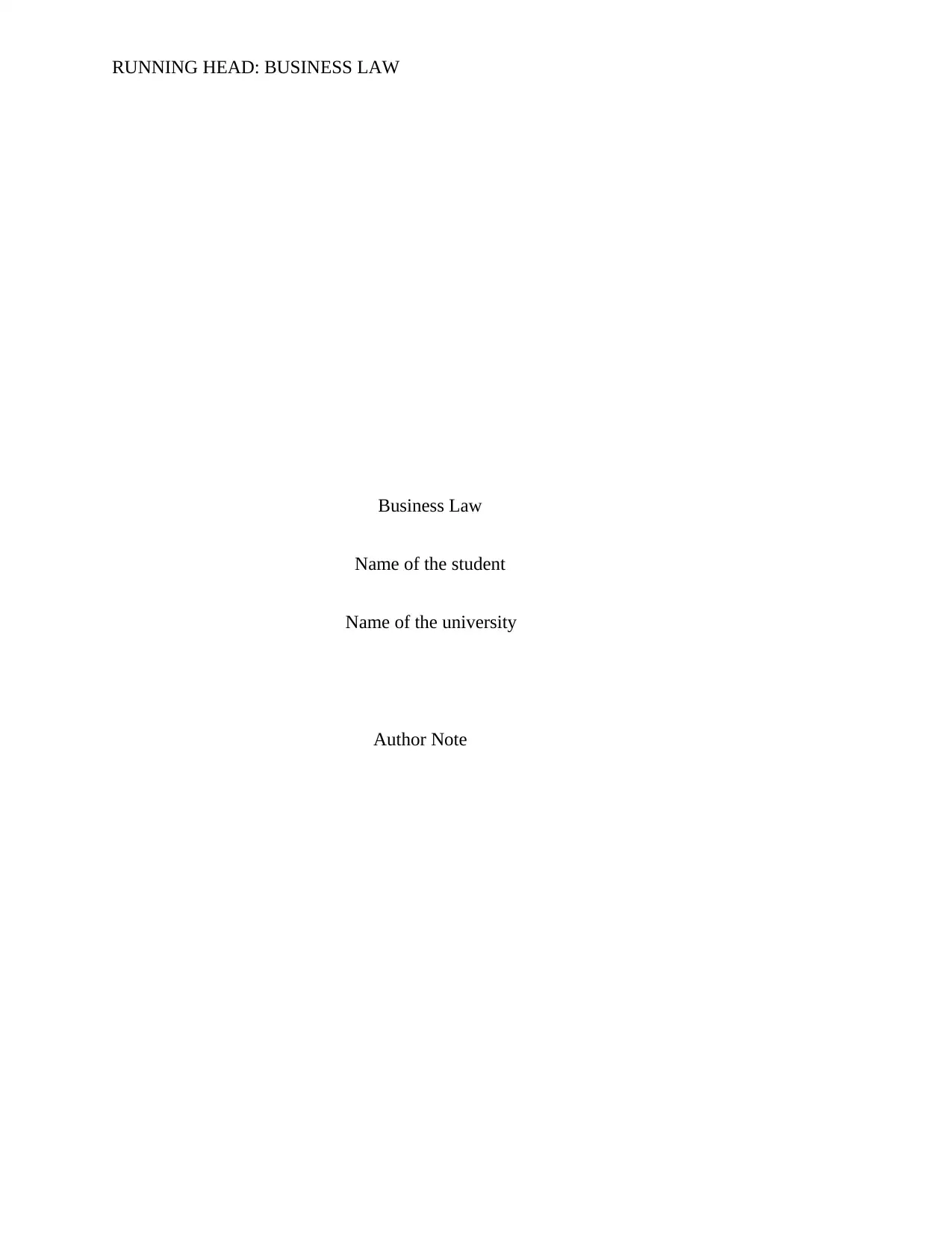
RUNNING HEAD: BUSINESS LAW
Business Law
Name of the student
Name of the university
Author Note
Business Law
Name of the student
Name of the university
Author Note
Paraphrase This Document
Need a fresh take? Get an instant paraphrase of this document with our AI Paraphraser
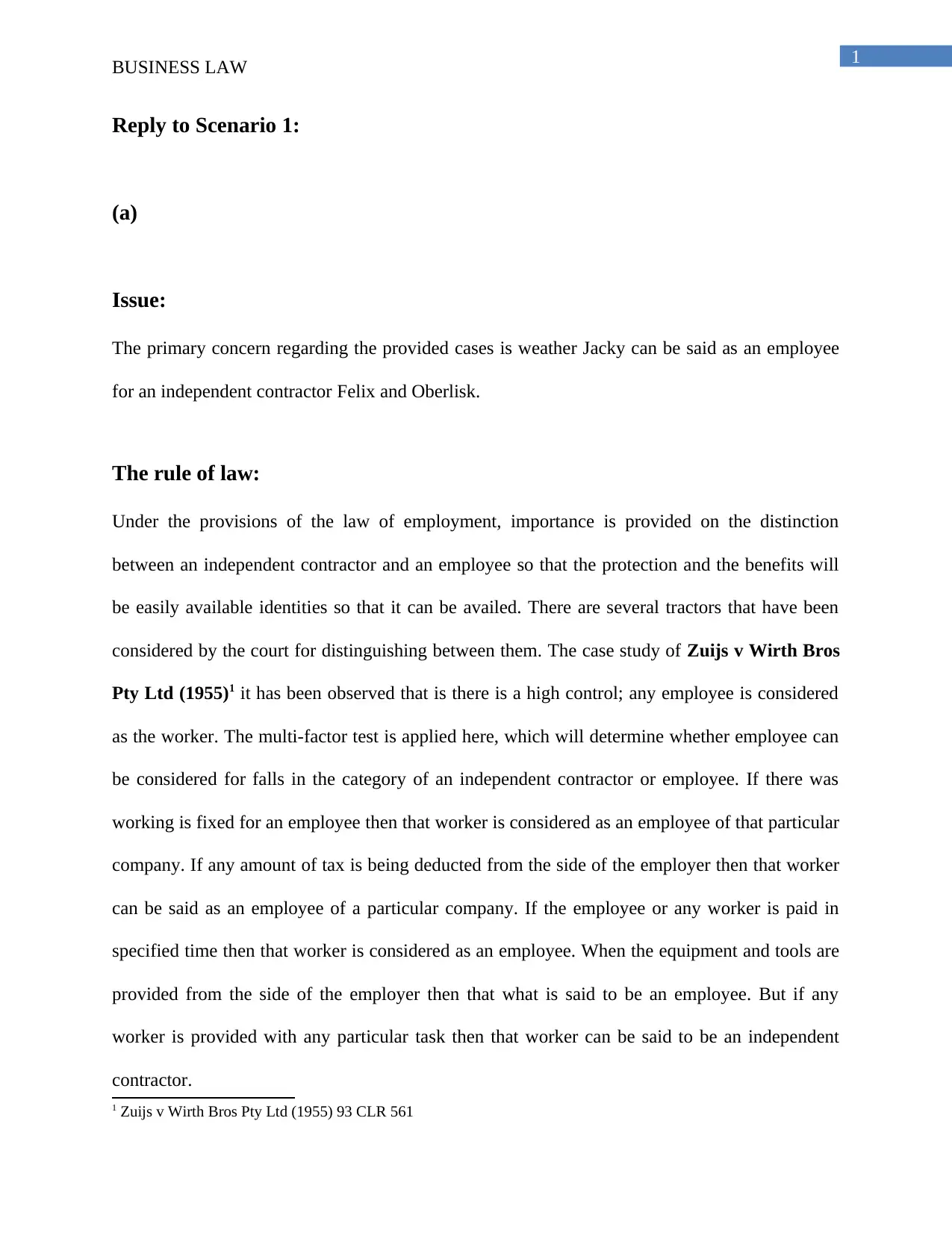
1
BUSINESS LAW
Reply to Scenario 1:
(a)
Issue:
The primary concern regarding the provided cases is weather Jacky can be said as an employee
for an independent contractor Felix and Oberlisk.
The rule of law:
Under the provisions of the law of employment, importance is provided on the distinction
between an independent contractor and an employee so that the protection and the benefits will
be easily available identities so that it can be availed. There are several tractors that have been
considered by the court for distinguishing between them. The case study of Zuijs v Wirth Bros
Pty Ltd (1955)1 it has been observed that is there is a high control; any employee is considered
as the worker. The multi-factor test is applied here, which will determine whether employee can
be considered for falls in the category of an independent contractor or employee. If there was
working is fixed for an employee then that worker is considered as an employee of that particular
company. If any amount of tax is being deducted from the side of the employer then that worker
can be said as an employee of a particular company. If the employee or any worker is paid in
specified time then that worker is considered as an employee. When the equipment and tools are
provided from the side of the employer then that what is said to be an employee. But if any
worker is provided with any particular task then that worker can be said to be an independent
contractor.
1 Zuijs v Wirth Bros Pty Ltd (1955) 93 CLR 561
BUSINESS LAW
Reply to Scenario 1:
(a)
Issue:
The primary concern regarding the provided cases is weather Jacky can be said as an employee
for an independent contractor Felix and Oberlisk.
The rule of law:
Under the provisions of the law of employment, importance is provided on the distinction
between an independent contractor and an employee so that the protection and the benefits will
be easily available identities so that it can be availed. There are several tractors that have been
considered by the court for distinguishing between them. The case study of Zuijs v Wirth Bros
Pty Ltd (1955)1 it has been observed that is there is a high control; any employee is considered
as the worker. The multi-factor test is applied here, which will determine whether employee can
be considered for falls in the category of an independent contractor or employee. If there was
working is fixed for an employee then that worker is considered as an employee of that particular
company. If any amount of tax is being deducted from the side of the employer then that worker
can be said as an employee of a particular company. If the employee or any worker is paid in
specified time then that worker is considered as an employee. When the equipment and tools are
provided from the side of the employer then that what is said to be an employee. But if any
worker is provided with any particular task then that worker can be said to be an independent
contractor.
1 Zuijs v Wirth Bros Pty Ltd (1955) 93 CLR 561
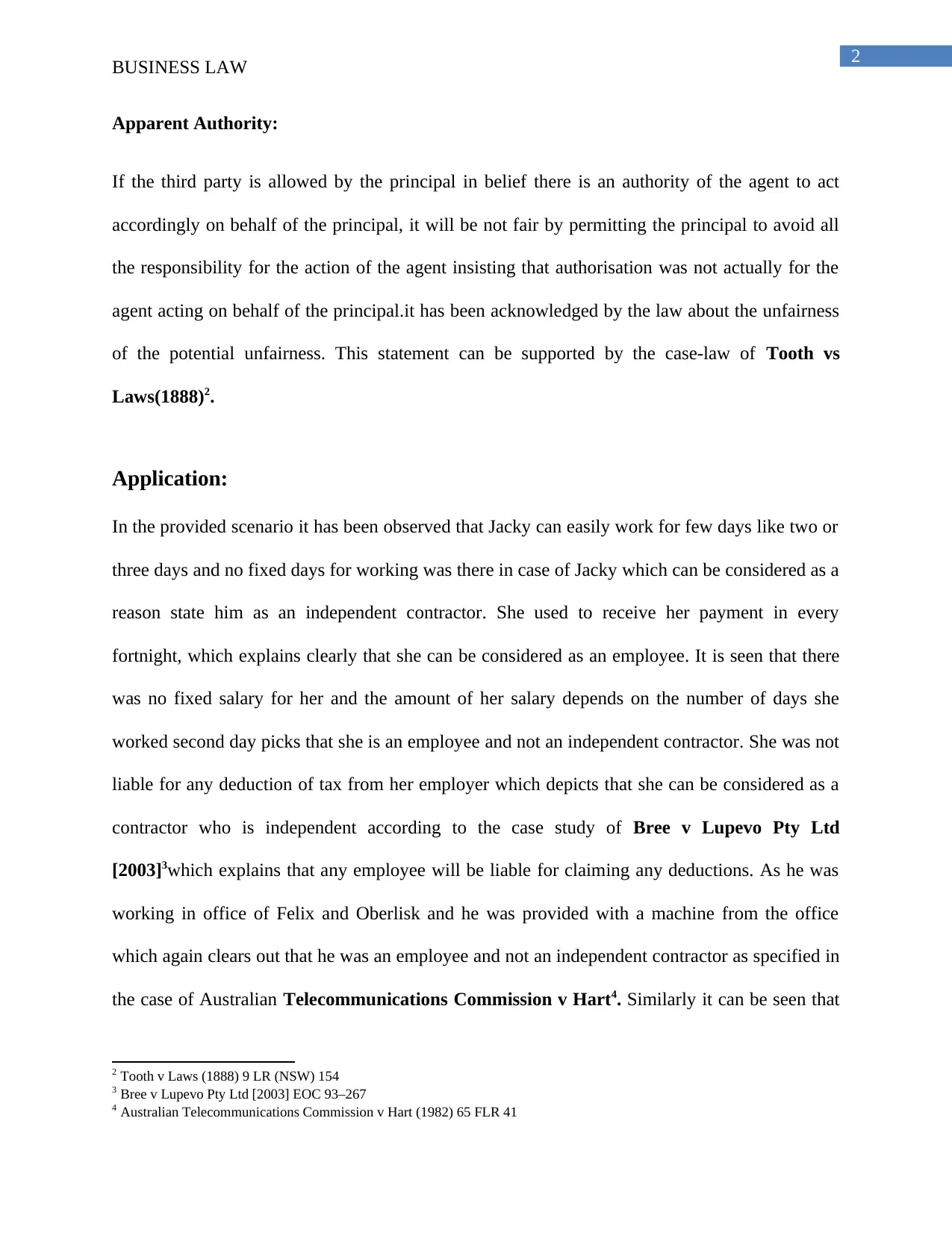
2
BUSINESS LAW
Apparent Authority:
If the third party is allowed by the principal in belief there is an authority of the agent to act
accordingly on behalf of the principal, it will be not fair by permitting the principal to avoid all
the responsibility for the action of the agent insisting that authorisation was not actually for the
agent acting on behalf of the principal.it has been acknowledged by the law about the unfairness
of the potential unfairness. This statement can be supported by the case-law of Tooth vs
Laws(1888)2.
Application:
In the provided scenario it has been observed that Jacky can easily work for few days like two or
three days and no fixed days for working was there in case of Jacky which can be considered as a
reason state him as an independent contractor. She used to receive her payment in every
fortnight, which explains clearly that she can be considered as an employee. It is seen that there
was no fixed salary for her and the amount of her salary depends on the number of days she
worked second day picks that she is an employee and not an independent contractor. She was not
liable for any deduction of tax from her employer which depicts that she can be considered as a
contractor who is independent according to the case study of Bree v Lupevo Pty Ltd
[2003]3which explains that any employee will be liable for claiming any deductions. As he was
working in office of Felix and Oberlisk and he was provided with a machine from the office
which again clears out that he was an employee and not an independent contractor as specified in
the case of Australian Telecommunications Commission v Hart4. Similarly it can be seen that
2 Tooth v Laws (1888) 9 LR (NSW) 154
3 Bree v Lupevo Pty Ltd [2003] EOC 93–267
4 Australian Telecommunications Commission v Hart (1982) 65 FLR 41
BUSINESS LAW
Apparent Authority:
If the third party is allowed by the principal in belief there is an authority of the agent to act
accordingly on behalf of the principal, it will be not fair by permitting the principal to avoid all
the responsibility for the action of the agent insisting that authorisation was not actually for the
agent acting on behalf of the principal.it has been acknowledged by the law about the unfairness
of the potential unfairness. This statement can be supported by the case-law of Tooth vs
Laws(1888)2.
Application:
In the provided scenario it has been observed that Jacky can easily work for few days like two or
three days and no fixed days for working was there in case of Jacky which can be considered as a
reason state him as an independent contractor. She used to receive her payment in every
fortnight, which explains clearly that she can be considered as an employee. It is seen that there
was no fixed salary for her and the amount of her salary depends on the number of days she
worked second day picks that she is an employee and not an independent contractor. She was not
liable for any deduction of tax from her employer which depicts that she can be considered as a
contractor who is independent according to the case study of Bree v Lupevo Pty Ltd
[2003]3which explains that any employee will be liable for claiming any deductions. As he was
working in office of Felix and Oberlisk and he was provided with a machine from the office
which again clears out that he was an employee and not an independent contractor as specified in
the case of Australian Telecommunications Commission v Hart4. Similarly it can be seen that
2 Tooth v Laws (1888) 9 LR (NSW) 154
3 Bree v Lupevo Pty Ltd [2003] EOC 93–267
4 Australian Telecommunications Commission v Hart (1982) 65 FLR 41
⊘ This is a preview!⊘
Do you want full access?
Subscribe today to unlock all pages.

Trusted by 1+ million students worldwide
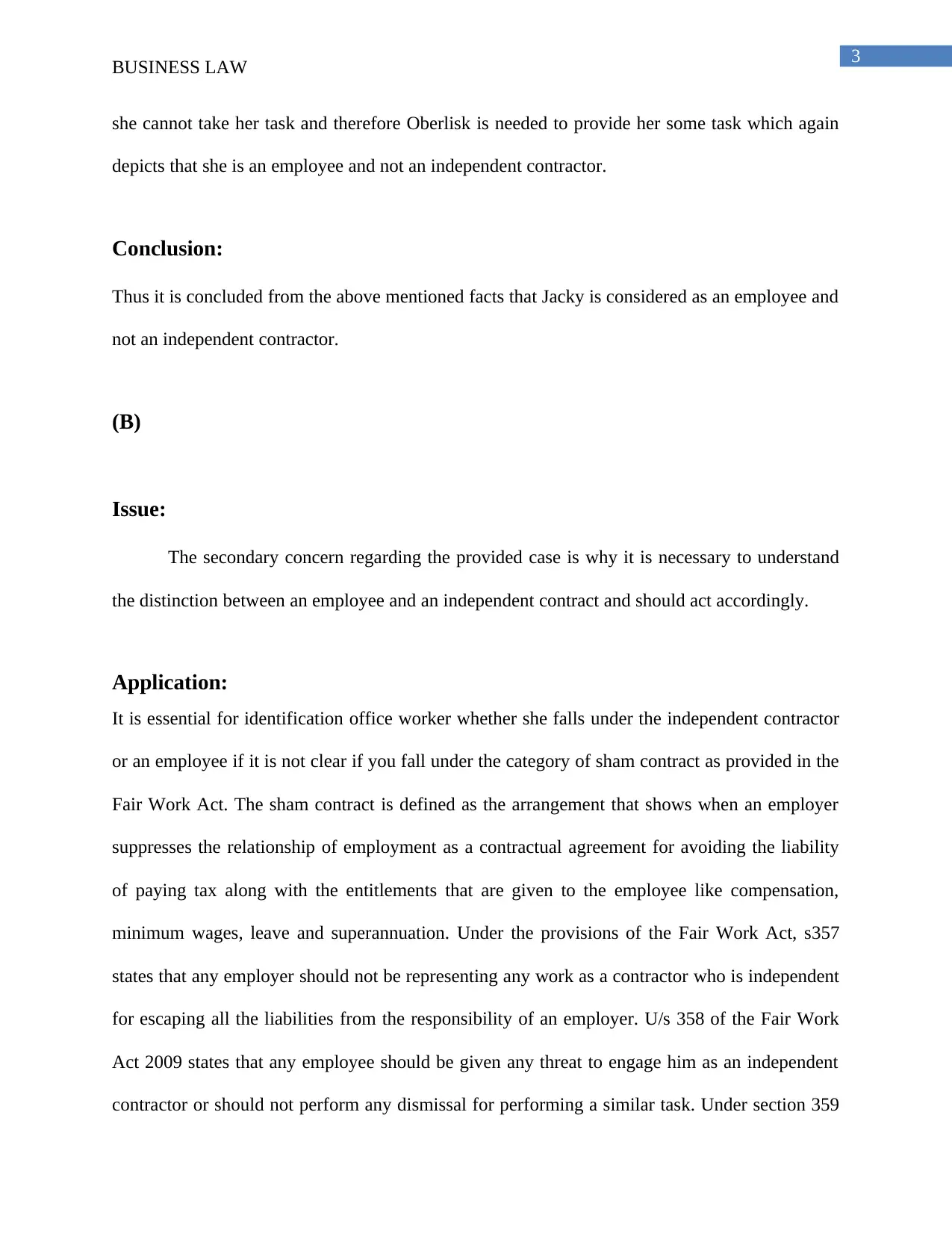
3
BUSINESS LAW
she cannot take her task and therefore Oberlisk is needed to provide her some task which again
depicts that she is an employee and not an independent contractor.
Conclusion:
Thus it is concluded from the above mentioned facts that Jacky is considered as an employee and
not an independent contractor.
(B)
Issue:
The secondary concern regarding the provided case is why it is necessary to understand
the distinction between an employee and an independent contract and should act accordingly.
Application:
It is essential for identification office worker whether she falls under the independent contractor
or an employee if it is not clear if you fall under the category of sham contract as provided in the
Fair Work Act. The sham contract is defined as the arrangement that shows when an employer
suppresses the relationship of employment as a contractual agreement for avoiding the liability
of paying tax along with the entitlements that are given to the employee like compensation,
minimum wages, leave and superannuation. Under the provisions of the Fair Work Act, s357
states that any employer should not be representing any work as a contractor who is independent
for escaping all the liabilities from the responsibility of an employer. U/s 358 of the Fair Work
Act 2009 states that any employee should be given any threat to engage him as an independent
contractor or should not perform any dismissal for performing a similar task. Under section 359
BUSINESS LAW
she cannot take her task and therefore Oberlisk is needed to provide her some task which again
depicts that she is an employee and not an independent contractor.
Conclusion:
Thus it is concluded from the above mentioned facts that Jacky is considered as an employee and
not an independent contractor.
(B)
Issue:
The secondary concern regarding the provided case is why it is necessary to understand
the distinction between an employee and an independent contract and should act accordingly.
Application:
It is essential for identification office worker whether she falls under the independent contractor
or an employee if it is not clear if you fall under the category of sham contract as provided in the
Fair Work Act. The sham contract is defined as the arrangement that shows when an employer
suppresses the relationship of employment as a contractual agreement for avoiding the liability
of paying tax along with the entitlements that are given to the employee like compensation,
minimum wages, leave and superannuation. Under the provisions of the Fair Work Act, s357
states that any employer should not be representing any work as a contractor who is independent
for escaping all the liabilities from the responsibility of an employer. U/s 358 of the Fair Work
Act 2009 states that any employee should be given any threat to engage him as an independent
contractor or should not perform any dismissal for performing a similar task. Under section 359
Paraphrase This Document
Need a fresh take? Get an instant paraphrase of this document with our AI Paraphraser
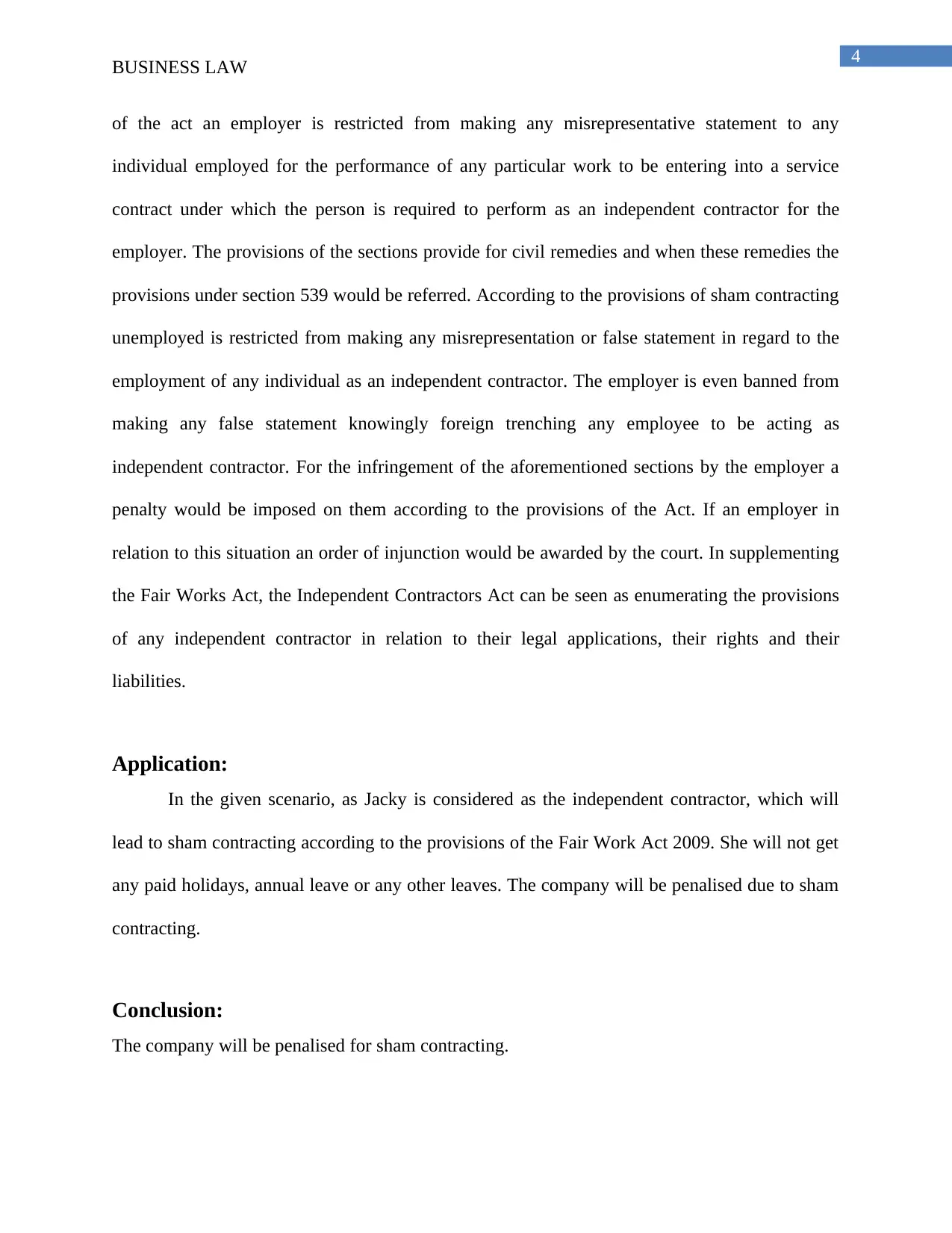
4
BUSINESS LAW
of the act an employer is restricted from making any misrepresentative statement to any
individual employed for the performance of any particular work to be entering into a service
contract under which the person is required to perform as an independent contractor for the
employer. The provisions of the sections provide for civil remedies and when these remedies the
provisions under section 539 would be referred. According to the provisions of sham contracting
unemployed is restricted from making any misrepresentation or false statement in regard to the
employment of any individual as an independent contractor. The employer is even banned from
making any false statement knowingly foreign trenching any employee to be acting as
independent contractor. For the infringement of the aforementioned sections by the employer a
penalty would be imposed on them according to the provisions of the Act. If an employer in
relation to this situation an order of injunction would be awarded by the court. In supplementing
the Fair Works Act, the Independent Contractors Act can be seen as enumerating the provisions
of any independent contractor in relation to their legal applications, their rights and their
liabilities.
Application:
In the given scenario, as Jacky is considered as the independent contractor, which will
lead to sham contracting according to the provisions of the Fair Work Act 2009. She will not get
any paid holidays, annual leave or any other leaves. The company will be penalised due to sham
contracting.
Conclusion:
The company will be penalised for sham contracting.
BUSINESS LAW
of the act an employer is restricted from making any misrepresentative statement to any
individual employed for the performance of any particular work to be entering into a service
contract under which the person is required to perform as an independent contractor for the
employer. The provisions of the sections provide for civil remedies and when these remedies the
provisions under section 539 would be referred. According to the provisions of sham contracting
unemployed is restricted from making any misrepresentation or false statement in regard to the
employment of any individual as an independent contractor. The employer is even banned from
making any false statement knowingly foreign trenching any employee to be acting as
independent contractor. For the infringement of the aforementioned sections by the employer a
penalty would be imposed on them according to the provisions of the Act. If an employer in
relation to this situation an order of injunction would be awarded by the court. In supplementing
the Fair Works Act, the Independent Contractors Act can be seen as enumerating the provisions
of any independent contractor in relation to their legal applications, their rights and their
liabilities.
Application:
In the given scenario, as Jacky is considered as the independent contractor, which will
lead to sham contracting according to the provisions of the Fair Work Act 2009. She will not get
any paid holidays, annual leave or any other leaves. The company will be penalised due to sham
contracting.
Conclusion:
The company will be penalised for sham contracting.
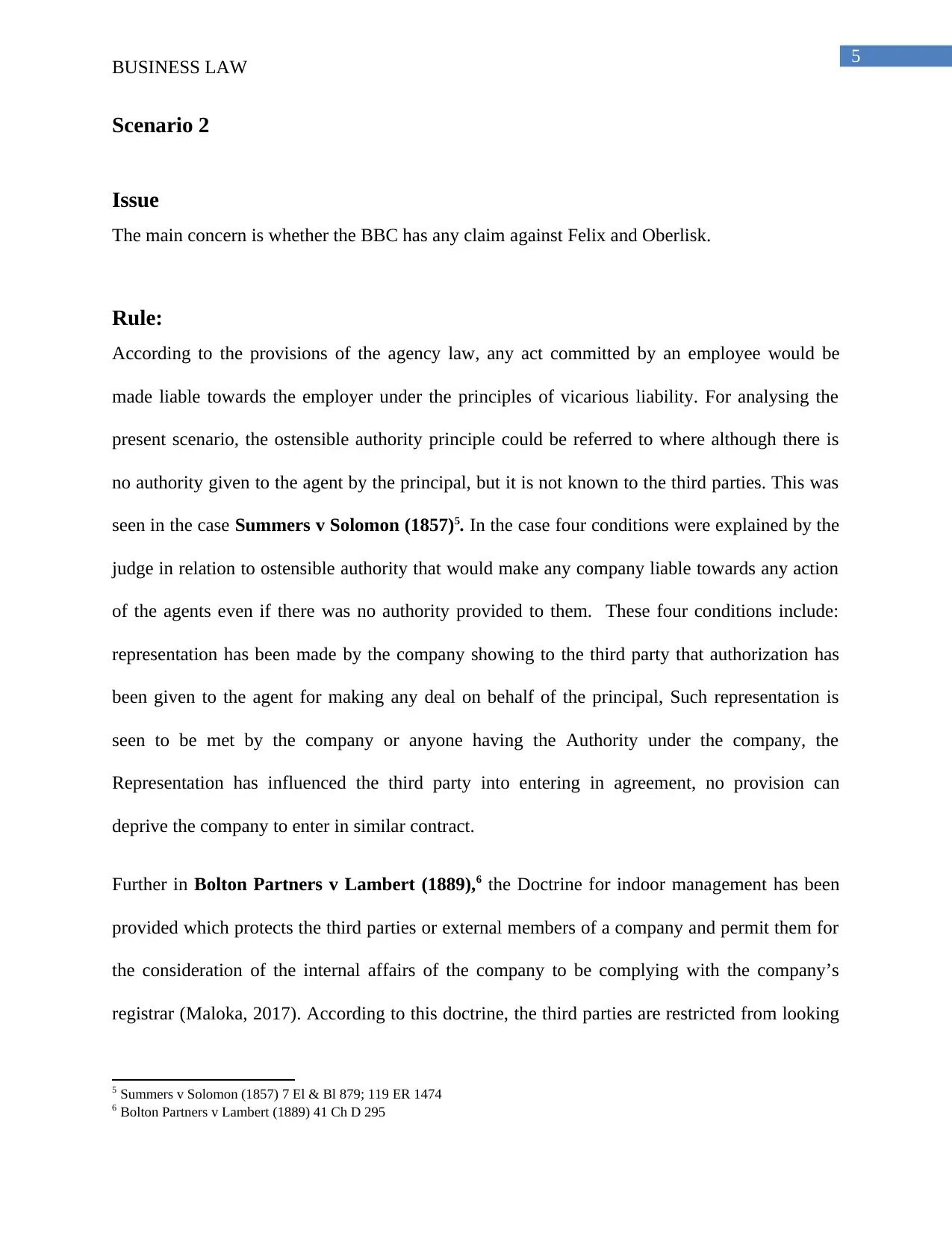
5
BUSINESS LAW
Scenario 2
Issue
The main concern is whether the BBC has any claim against Felix and Oberlisk.
Rule:
According to the provisions of the agency law, any act committed by an employee would be
made liable towards the employer under the principles of vicarious liability. For analysing the
present scenario, the ostensible authority principle could be referred to where although there is
no authority given to the agent by the principal, but it is not known to the third parties. This was
seen in the case Summers v Solomon (1857)5. In the case four conditions were explained by the
judge in relation to ostensible authority that would make any company liable towards any action
of the agents even if there was no authority provided to them. These four conditions include:
representation has been made by the company showing to the third party that authorization has
been given to the agent for making any deal on behalf of the principal, Such representation is
seen to be met by the company or anyone having the Authority under the company, the
Representation has influenced the third party into entering in agreement, no provision can
deprive the company to enter in similar contract.
Further in Bolton Partners v Lambert (1889),6 the Doctrine for indoor management has been
provided which protects the third parties or external members of a company and permit them for
the consideration of the internal affairs of the company to be complying with the company’s
registrar (Maloka, 2017). According to this doctrine, the third parties are restricted from looking
5 Summers v Solomon (1857) 7 El & Bl 879; 119 ER 1474
6 Bolton Partners v Lambert (1889) 41 Ch D 295
BUSINESS LAW
Scenario 2
Issue
The main concern is whether the BBC has any claim against Felix and Oberlisk.
Rule:
According to the provisions of the agency law, any act committed by an employee would be
made liable towards the employer under the principles of vicarious liability. For analysing the
present scenario, the ostensible authority principle could be referred to where although there is
no authority given to the agent by the principal, but it is not known to the third parties. This was
seen in the case Summers v Solomon (1857)5. In the case four conditions were explained by the
judge in relation to ostensible authority that would make any company liable towards any action
of the agents even if there was no authority provided to them. These four conditions include:
representation has been made by the company showing to the third party that authorization has
been given to the agent for making any deal on behalf of the principal, Such representation is
seen to be met by the company or anyone having the Authority under the company, the
Representation has influenced the third party into entering in agreement, no provision can
deprive the company to enter in similar contract.
Further in Bolton Partners v Lambert (1889),6 the Doctrine for indoor management has been
provided which protects the third parties or external members of a company and permit them for
the consideration of the internal affairs of the company to be complying with the company’s
registrar (Maloka, 2017). According to this doctrine, the third parties are restricted from looking
5 Summers v Solomon (1857) 7 El & Bl 879; 119 ER 1474
6 Bolton Partners v Lambert (1889) 41 Ch D 295
⊘ This is a preview!⊘
Do you want full access?
Subscribe today to unlock all pages.

Trusted by 1+ million students worldwide
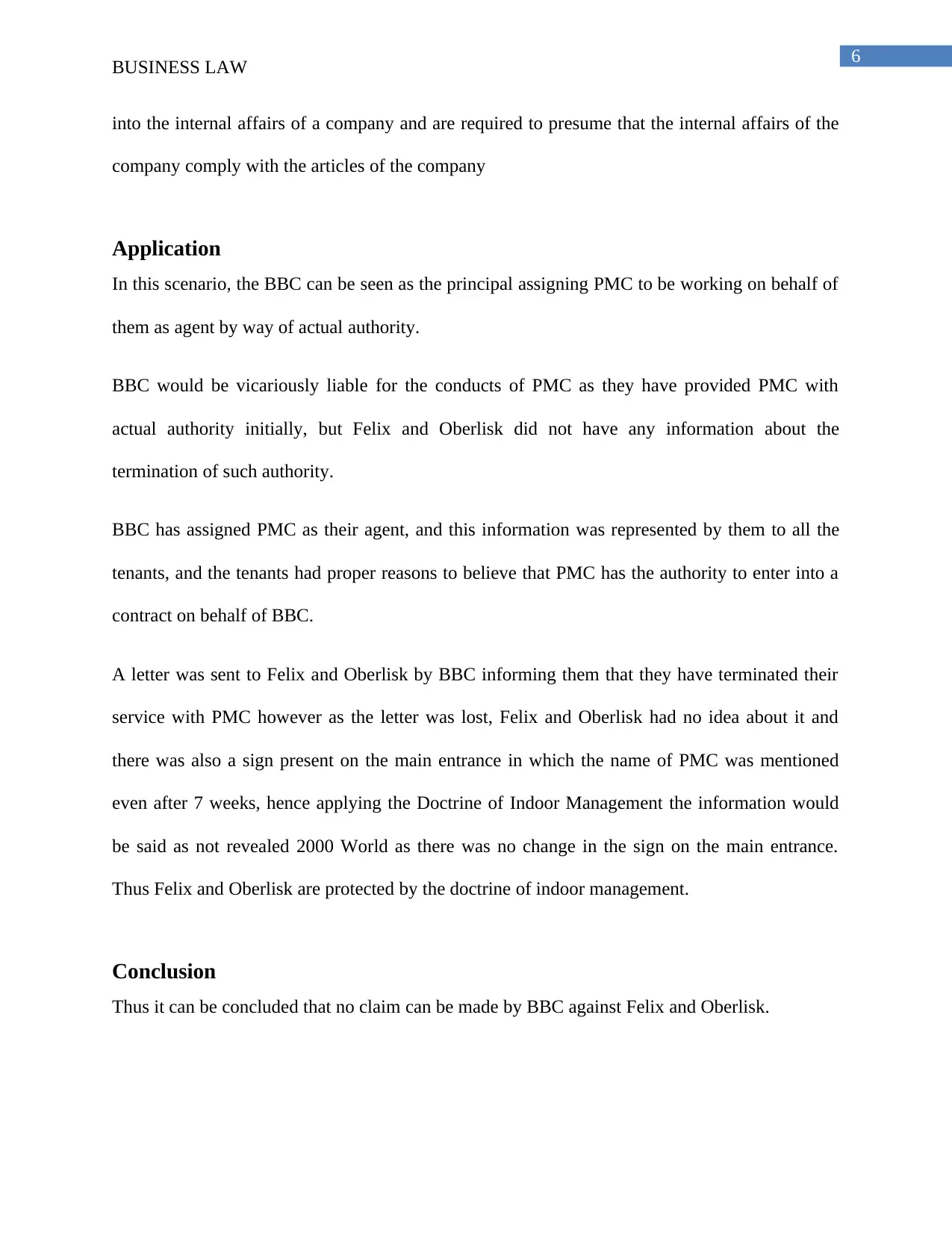
6
BUSINESS LAW
into the internal affairs of a company and are required to presume that the internal affairs of the
company comply with the articles of the company
Application
In this scenario, the BBC can be seen as the principal assigning PMC to be working on behalf of
them as agent by way of actual authority.
BBC would be vicariously liable for the conducts of PMC as they have provided PMC with
actual authority initially, but Felix and Oberlisk did not have any information about the
termination of such authority.
BBC has assigned PMC as their agent, and this information was represented by them to all the
tenants, and the tenants had proper reasons to believe that PMC has the authority to enter into a
contract on behalf of BBC.
A letter was sent to Felix and Oberlisk by BBC informing them that they have terminated their
service with PMC however as the letter was lost, Felix and Oberlisk had no idea about it and
there was also a sign present on the main entrance in which the name of PMC was mentioned
even after 7 weeks, hence applying the Doctrine of Indoor Management the information would
be said as not revealed 2000 World as there was no change in the sign on the main entrance.
Thus Felix and Oberlisk are protected by the doctrine of indoor management.
Conclusion
Thus it can be concluded that no claim can be made by BBC against Felix and Oberlisk.
BUSINESS LAW
into the internal affairs of a company and are required to presume that the internal affairs of the
company comply with the articles of the company
Application
In this scenario, the BBC can be seen as the principal assigning PMC to be working on behalf of
them as agent by way of actual authority.
BBC would be vicariously liable for the conducts of PMC as they have provided PMC with
actual authority initially, but Felix and Oberlisk did not have any information about the
termination of such authority.
BBC has assigned PMC as their agent, and this information was represented by them to all the
tenants, and the tenants had proper reasons to believe that PMC has the authority to enter into a
contract on behalf of BBC.
A letter was sent to Felix and Oberlisk by BBC informing them that they have terminated their
service with PMC however as the letter was lost, Felix and Oberlisk had no idea about it and
there was also a sign present on the main entrance in which the name of PMC was mentioned
even after 7 weeks, hence applying the Doctrine of Indoor Management the information would
be said as not revealed 2000 World as there was no change in the sign on the main entrance.
Thus Felix and Oberlisk are protected by the doctrine of indoor management.
Conclusion
Thus it can be concluded that no claim can be made by BBC against Felix and Oberlisk.
Paraphrase This Document
Need a fresh take? Get an instant paraphrase of this document with our AI Paraphraser
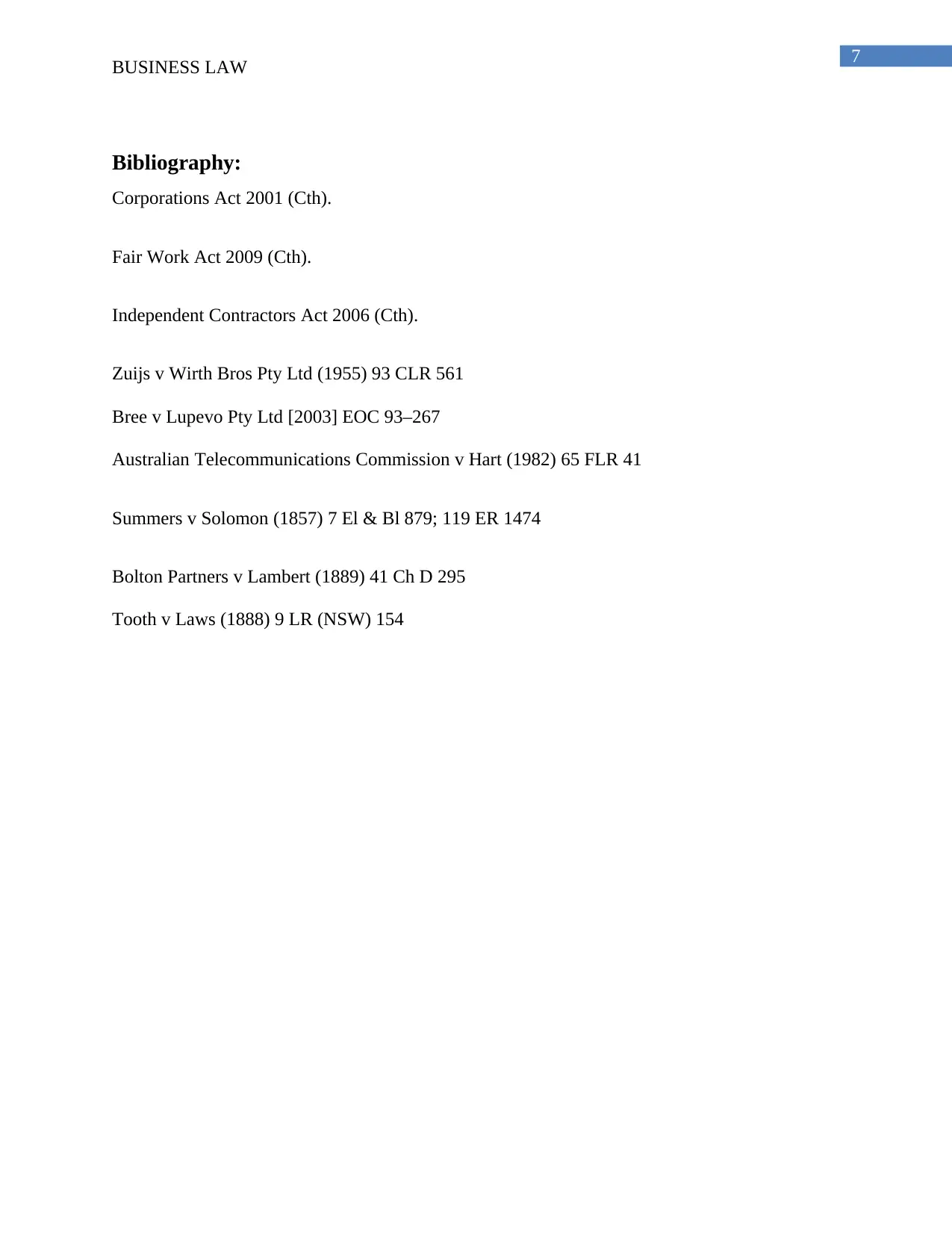
7
BUSINESS LAW
Bibliography:
Corporations Act 2001 (Cth).
Fair Work Act 2009 (Cth).
Independent Contractors Act 2006 (Cth).
Zuijs v Wirth Bros Pty Ltd (1955) 93 CLR 561
Bree v Lupevo Pty Ltd [2003] EOC 93–267
Australian Telecommunications Commission v Hart (1982) 65 FLR 41
Summers v Solomon (1857) 7 El & Bl 879; 119 ER 1474
Bolton Partners v Lambert (1889) 41 Ch D 295
Tooth v Laws (1888) 9 LR (NSW) 154
BUSINESS LAW
Bibliography:
Corporations Act 2001 (Cth).
Fair Work Act 2009 (Cth).
Independent Contractors Act 2006 (Cth).
Zuijs v Wirth Bros Pty Ltd (1955) 93 CLR 561
Bree v Lupevo Pty Ltd [2003] EOC 93–267
Australian Telecommunications Commission v Hart (1982) 65 FLR 41
Summers v Solomon (1857) 7 El & Bl 879; 119 ER 1474
Bolton Partners v Lambert (1889) 41 Ch D 295
Tooth v Laws (1888) 9 LR (NSW) 154
1 out of 8
Related Documents
Your All-in-One AI-Powered Toolkit for Academic Success.
+13062052269
info@desklib.com
Available 24*7 on WhatsApp / Email
![[object Object]](/_next/static/media/star-bottom.7253800d.svg)
Unlock your academic potential
Copyright © 2020–2026 A2Z Services. All Rights Reserved. Developed and managed by ZUCOL.





